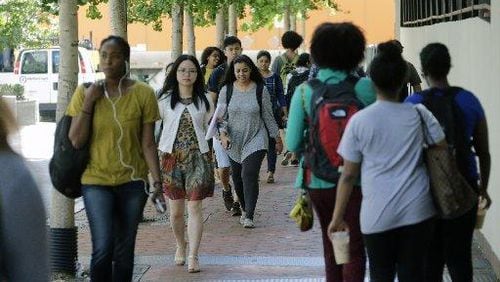During her first week of school, a Muslim student was asked to remove her veil by a Georgia State University teacher. She refused.
Nabila Khan, a first-year student, is now at the center of a controversy about religious freedom.
She told The Signal, the school's newspaper, that the teacher held her back after class and asked her not to conceal her face while in class, as was written in the syllabus. Khan refused, and said she believed being required to remove her niqab violated her rights to freedom of speech and religion.
Khan said in the article that she chooses to wear the niqab, which is a veil that covers all but the eyes, to work and school.
“Many people have this misconception that, as Muslim women, we’re oppressed or forced to wear it. For me, it’s a choice. My parents never forced me to wear it,” she said.
The teacher gave Khan a copy of Georgia’s anti-mask laws after she refused to unveil. Khan told the teacher she would take the issue to the school administration and would get a lawyer if necessary. Khan asked The Signal not to name the teacher.
A university spokesman said veils are allowed on campus as part of religious practice, and that was communicated to the student. A spokesman for the University System of Georgia supported GSU’s stance on allowing the student to continue wearing her niqab, according to the article.
State Senator Joshua McKoon, R-Columbus, said his religious freedom bill, which was vetoed by Gov. Nathan Deal in April after facing backlash from gay rights groups and business leaders, would've helped Khan if she had decided to sue. He said he believes his bill would've given a possible lawsuit a higher legal standard.
He suggested, for example, an accommodation could have been made if the teacher wanted the student to remove her niqab during roll call. Critics of religious liberty bills across the country say the bills lead to greater discrimination.
Gov. Deal said he vetoed the bill because it did not reflect Georgia’s image of “warm, friendly and loving people.”
Adding a religious exemption to Georgia’s anti-mask law would not be enough, McKoon said. The law, which dates to the 1950s, was put in place to keep members of the Ku Klux Klan from wearing hoods and obscuring their identities.
The law states that any person who obscures their face with a mask or hood on public property, or without written permission from the owner on private property, is guilty of a misdemeanor.
About the Author






